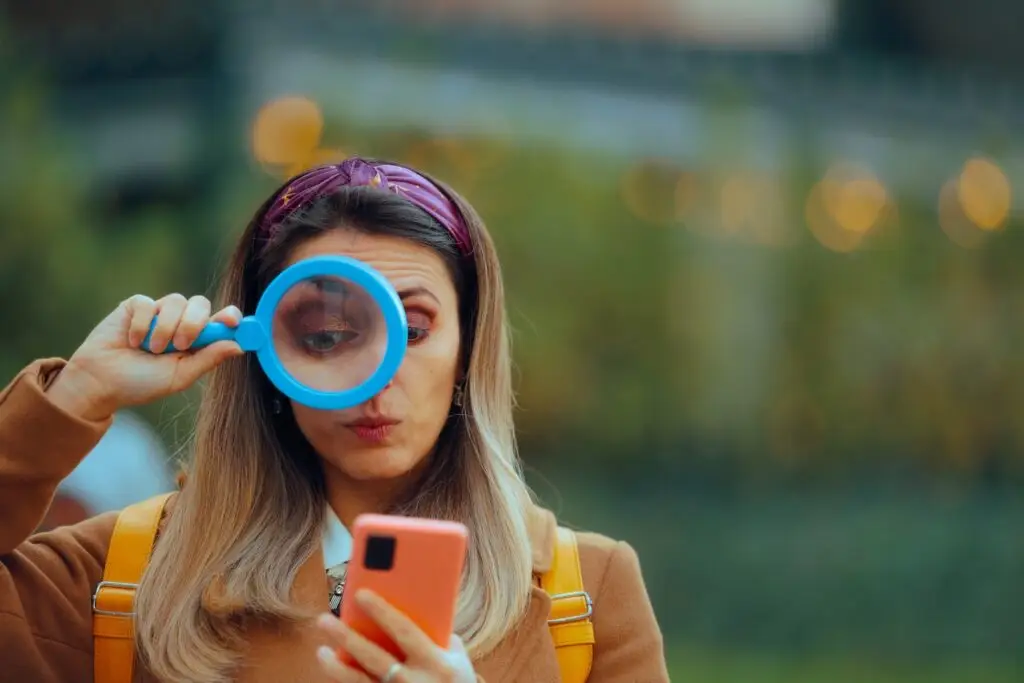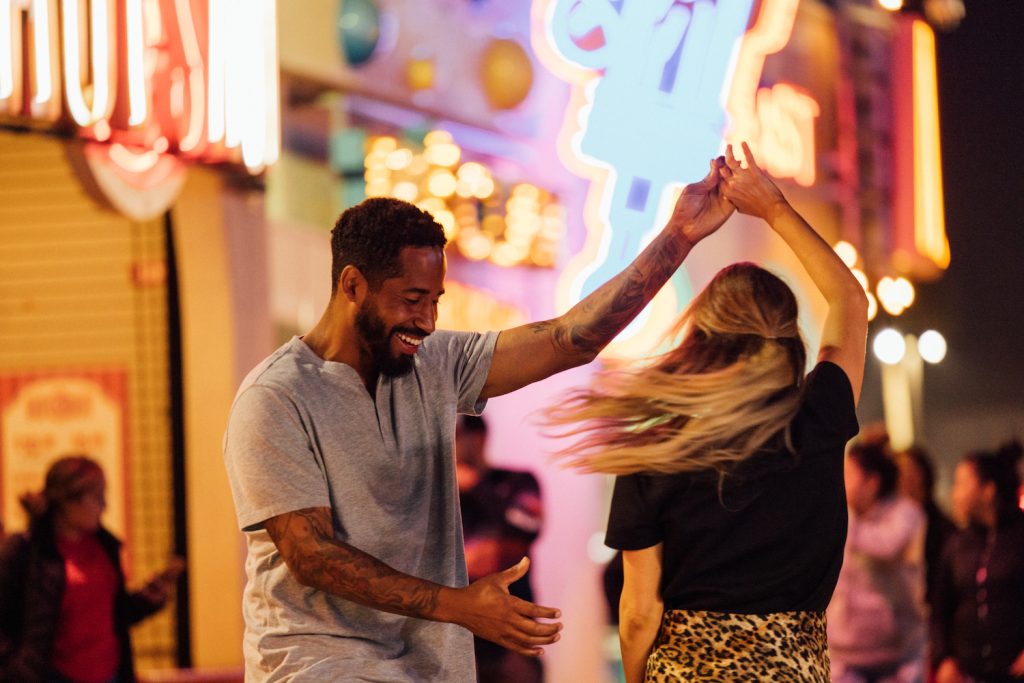The world’s matchmakers have been atwitter lately, according to Sophy Singer, San Diego founder and executive coach behind matchmaking service Sophy Love.
In June, Materialists hit theaters, starring Dakota Johnson as Lucy, a matchmaker for fictional New York company Adore. The film navigates not only the complicated and sometimes unrealistic expectations of her clientele but the matchmaking mathematics of Lucy’s own love life, as well.
Singer, like many matchmakers in her community, waited in anticipation to see whether the movie’s portrayal of the industry would reflect their real-life experiences. I spoke with Singer about her thoughts on Materialists.
“It didn’t portray matchmaking in a wonderful light,” she admits. “But it does remove the stigma and normalizes matchmaking [to a broader audience].”
According to Materialists, matchmaking is like working at a morgue or an insurance company: Each person is reduced to a set of rote information and statistical analyses, with a price tag to match. Men are valued primarily for their height and bank accounts, women for their youthfulness and level of education.
The film’s director, Celine Song, worked at a large matchmaking company for six months early in her career to support her aspirations as a playwright. Her experience informed much of the film’s premise, including the structure of marketability upon which Lucy evaluates each of her clients. It makes modern dating feel like the stock market—a person’s valuation rises and falls according to perceived worth.
Singer laments the “check-box driven, transactional, and slightly impersonal matchmaking process” that’s portrayed in the movie.
“What it really misses is an integrative and holistic approach. It misses the deeper, more human side of matchmaking,” she says. “For my business, it’s not just the matchmaking and the matches, but understanding our clients on a deeper level and understanding what’s holding them back.”
Singer looks at her clients not as a static set of stats, she adds, but as people capable of growth and development, with the opportunity to change their lives for the better.
“What are their patterns?” Singer wonders about her clients. “They are the common denominator, in a good way. If [people] are able to look at the underlying parts and patterns of themselves that are showing up in the dating space, that’s where the work is.”
If someone is consistently unable to make it past the six-month mark in their relationships, for example, it’s probably not because they’re too short or too old. Maybe they’re meeting quality people, but their own past traumas—either with family or early romantic partners—are prompting them to put up walls and sabotage the chance for a deeper connection. It’s a lot more complicated than the 1s and 0s approach Lucy seems to take.
In Materialists, matchmakers like Lucy throw clients into the fray without really helping them unpack what’s going on internally. In fact, if Lucy had done some more digging on one of her client’s matches, she could have potentially avoided some devastating consequences—but I won’t spoil the movie for you here.
Singer’s business uses a psychology-driven and trauma-informed modality called IFS (internal family systems) to help clients tap into what’s holding them back in the dating space. She looks at dating and relationships as the next chapter of a person’s healing and growth overall, not just the avenue to lock down a spouse and somehow live perpetually in “happily ever after.”
“There’s a huge opportunity for a completely different result than [clients have] ever had before,” she says.
Sophy argues that, when you’re not addressing the internal self and “who’s at the wheel of the bus,” you may be doomed to repeat the same cycle you’ve been in, even after accessing a dating service. Singer addresses this head-on with her clients and offers IFS-based courses for clients to learn more about themselves and identify issues they’d like to work on before meeting would-be partners.
Think of it like “match-coaching” before the more traditional matchmaking begins.

Singer points to a particular scene in the movie: One of Lucy’s clients is crying on her wedding day, minutes before she’s set to walk down the aisle. The client admits that she’s not excited to marry her groom. He checks all the boxes, but her real motivation was to one-up her sister with a husband that she believes is more impressive than her sibling’s. “So, this is about value,” Lucy points out, making the case that marrying someone because they offer you a sense of external value is a valid reason to stay with them forever. Relieved, the mascara-streaked client moves ahead with the wedding.
But Singer holds a critical eye to this scene. “A relationship built on that level of an unconscious dynamic [is ultimately unsustainable],” she argues. At some point, what everyone else sees—that external value—will become less relevant than the fact that you’re with someone who doesn’t meet your deeper, less obvious needs. Once that happens, most people find that their attraction to that person fades fast, since the motivation to be with them was misplaced in the first place.
I ask Singer about the math of matchmaking portrayed in the movie, with perfection—or “unicorn status”—being the goal. Are people even attracted to perfection?
“There’s this problem of ‘the checklist,’” she says. “The era of dating apps has led to people treating dating as a shopping endeavor. It puts you into an evaluative mindset, and that’s how you’re showing up on dates. As people stay single longer and longer, they are not only evaluating [others], but they feel that they are being evaluated. So people are showing up in a performative manner, not as an authentic version of who they really are.”
Singer has found that people actually connect to the messiest parts of the human experience the most, because everyone understands it. She notices that women, especially, act overly low-maintenance or pretend to not have any needs when it comes to presenting themselves on dates.
“That’s not relatable. I’m trying to unravel all of that. People feel lonely and disconnected and keep having the same superficial conversations over and over,” Singer says. “They’re not understanding why they can’t connect. But that’s because they haven’t tapped into what it means to be relational and share what they’re experiencing in the moment.”
The problem is, when you show up as this breezy, unbothered version of yourself, you’re setting yourself up for failure. Not only are you less relatable in the moment, but you are creating a situation where you’re bound to lose face at some point. Once that happens, the other person may feel that you weren’t truthful about who you made yourself out to be.
Singer uses an empathetic, come-as-you-are approach to dating called “authentic relating.” The practice “allows you to reveal yourself [and also] set the stage for others to reveal themselves,” she says. “Dating can then be a gift to another person to feel seen and heard. And, when you do it that way, and it’s not about checking off a checklist, the outcome of the date doesn’t matter as much as the experience itself, and more connections can happen that way.”
Authentic relating allows each date to become less about evaluating for a perfect fit. When you let real connection happen, then finding love doesn’t have to feel like a job interview, even if you ultimately decide that person isn’t for you.
I ask if Singer felt the movie got anything right.
She laughs. “Lucy’s rant made me feel seen,” she says, referring to a scene in which Lucy drops the checklists for a moment and gives her dissatisfied clients a much-needed reality check.
“This is not a simulation. People are people are people are people. They come as they are,” she says.
Singer agrees with Lucy’s sentiments. “This isn’t Build-A-Bear!” she jokes. “An endless laundry list of perceived must-haves can lead you to overlook people who might actually be great matches for you, but don’t perfectly fill out all of your criteria.” (If you’d like to watch the rant without committing to a two-hour movie, search it up on TikTok.)
In my own life, I’ve found that checklists are often defenses against insecurity—a system of rigid rules to protect from pain and disappointment. They often tend to reflect our external ideas of worth, not authentic self-awareness. As Lucy says, “You are not a catch, because you are not a fish.”
I’m holding Singer’s advice as I navigate my own dating journey. As things move forward with Robin, I truly hope to bring my authentic self to the table. I’m trying to be honest with my flaws and not pretend that I’m perfect. And I’ve been pleasantly surprised to see her share her own insecurities with me. It makes me feel like I understand her better and can communicate with her in a way that makes both of us feel more seen. That, in itself, feels like a win—and gives me some real material to work with.
If you’re new to Unhinged, catch up on all the dating chats you’ve missed here with columnists Nicolle Monico and Natalie Cooper. And follow along at @monicles and @sandiegomag on Instagram to know when a new article drops each week.
Sign up now for the Unhinged newsletter for exclusive content, Q&As with columnists Nicolle and Natalie, and subscriber-only meet-ups!

























